Ministry of Science & Technology
CSIR-NIScPR’s NATIONAL SEMINAR ON SCIENCE COMMUNICATION
Distilling Correct Scientific Information is a huge Challenge and here Science Communication has a big Role to Play: PSA to Govt. of India
प्रविष्टि तिथि:
11 MAR 2022 5:30PM by PIB Delhi
Communicating to political leaders, bureaucrats, scientists, students and public at one go as our targeted audience is a huge challenge. These days extraordinary information is available, but a focused communication with an ability to distill the garbage is a crucial challenge. Disinformation and misinformation are easy to communicate, as it does not have any credibility, but transmitting correct and scientific information is a bigger issue. For example, salt, fat and sugar are very easy to get addicted to, but the absence of these three in a healthy diet are very difficult to take. Prof K. VijayRaghavan, Principal Scientific Adviser to Govt. of India was addressing the national seminar on science communication, organized by the CSIR-National Institute of Science Communication and Policy Research (NIScPR) on 10 March 2022.
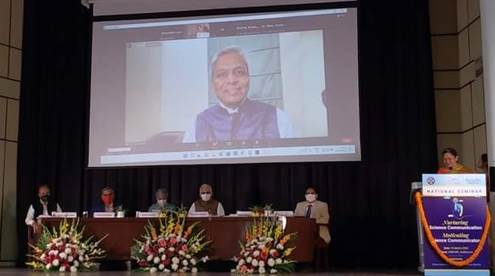
PSA Prof. VijayRaghavan while addressing the National Seminar on Science Communication by CSIR-NIScPR
The Seminar was organized in hybrid mode at the CSIR-NPL auditorium, New Delhi and its central theme was “Nurturing Science Communication – Motivating Science Communicators”. In this seminar around 15 institutions engaged in science communication came together on a single platform to share their views and ideas for strengthening the science communication efforts.
In his presidential remarks, Dr Shekhar C. Mande, Director-General, CSIR asserted that we all need to be better communicators. Good communication skills and knowledge of history can be improvised upon, for us to be better communicators. As a scientist, we need to understand the science and technology involved as to how it was done 100 years ago and how things have changed. So will it be that after 100 years from now, people will be amazed, as to how we handled the issues. As scientists, we take prestige in peer reviewed journals, social scientists take pride in how it has changed the human life. But to involve the general public all the time about all the activities with the applications is the role of science communicators. We are short of people who can connect with general mass and scientists' happening behind the walls.
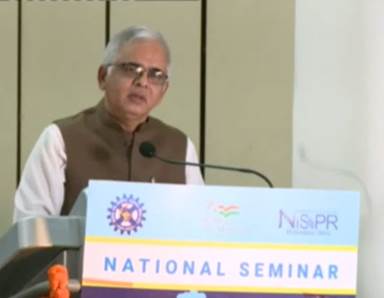
Dr Shekhar C. Mande, DG, CSIR stressed to encourage science communicators who can connect with the general mass as well as the scientists
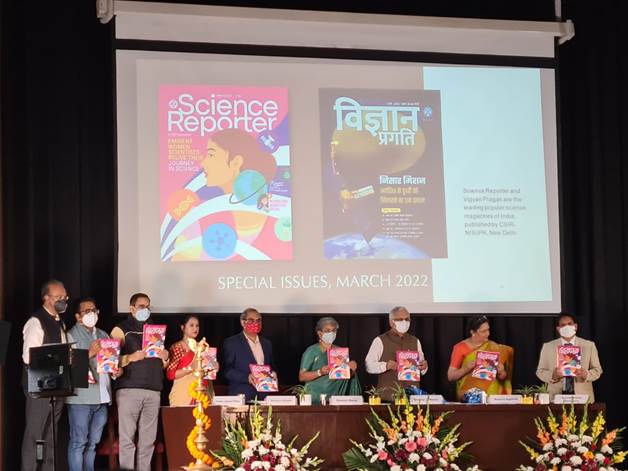
During NIScPR’s Seminar many of the science publications released including the March 2022 issues of two monthly popular science magazines ‘Science Reporter’ & ‘Vigyan Pragati’ which are focused on women scientists
Prof. Ranjana Aggarwal, Director, CSIR-NIScPR elaborated the institute's commitment to provide correct information in the right manner with the engagement of the society. The challenge is to produce new science communicators and writers. She emphasized the need for much more science based stories than research papers alone from the scientific community that can impact the society.
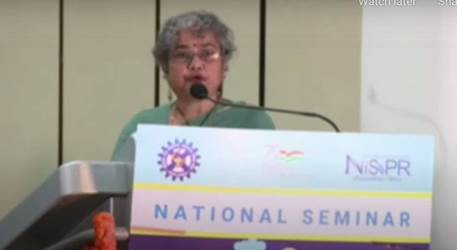
Dr. Sharmila Mande, Distinguished Chief Scientist with TCS Research
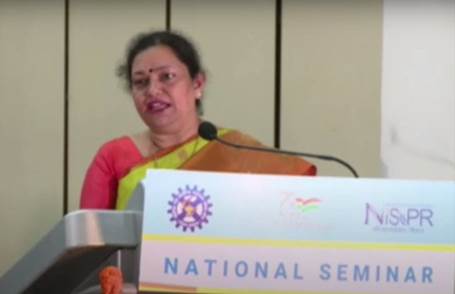
Prof. Ranjana Aggarwal, Director, CSIR-NIScPR
Distinguished Guest of the Seminar, Dr Sharmila Mande, Chief Scientist with TCS Research, Tata Consultancy said, “Science lab work changes peoples’ livies, but school children need to know what's happening in the world of science. Future of healthcare is going to depend on preventive and scientific advances. Predicting diseases based on the drop of blood or a stool is in the offing. Scientific endeavors need to be made known in a simplistic manner in the form of book, animation, etc.”
Guest of Honour Prof Venugopal Achanta, Director, CSIR-National Physical Laboratory (CSIR-NPL) said that science communicators should not focus only on reporting research published in foreign journals. There is considerable research being carried out on local problems. These need to be communicated as well, Prof Achanta added.
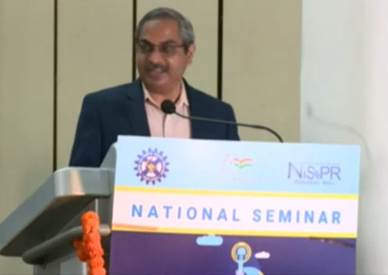
Prof Venugopal Achanta, Director, CSIR-National Physical Laboratory
Prof Avanish Kumar Srivastava, Director, CSIR-AMPRI stressed on how science can uplift the life of tribal people. Science communication is made up of science outreach and science inreach. Outreach is like a museum and inreach is a dialogue among scientists. Impact factor of Indian journals need to be recognized globally.
He highlighted the disconnect between the hardcore scientists and journalists. He said that The National Seminar like this one is another step to bring closer the scientists and science communicators.
On the occasion, science publications of CSIR-NIScPR were released, that include Theme book of the National Seminar, Report on “Women in STEM : A CSIR survey towards Gender Parity”, Science Reporter & Vigyan Pragati (March 2022 issues), the book titled “Mere Chuninda Vigyan Lekh” authored by Dr Manish Mohan Gore, Scientist, CSIR-NIScPR and “Vaigyanik Jagdish Chandra Bose Ke Mahaan Vichaar” by Sawan kumar bag, Post Doctoral Fellow, Bar-Ilan University, Israel and Meher Wan, Scientist, CSIR-NIScPR.
The first session was on the topic Promoting Science Outreach & Communication. Dr Rajeev Kumar Mehajan, Scientist-G, SERB chaired the session and the panelists included; Dr Jyotsna Dhawan, CEO, DBT/Wellcome Trust India Alliance; Dr C.M Nautiyal, Program Consultant, (Science Communication), Indian National Science Academy (INSA); Dr Anurag Kumar, Director, Science City, Kolkata, National Council of Science Museums (NCSM); Dr Santosh Shukla, In charge Officer (Science Popularization) National Academy of Sciences India (NASI); Shri Nimish Kapoor, Scientist, Vigyan Prasar, DST and Dr Rohini Garg, Member, Indian National Young Academy of Sciences (INYAS).
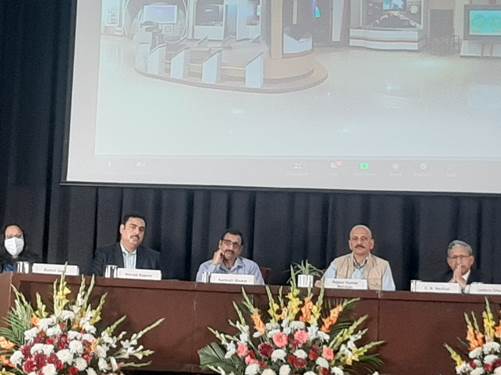
Speakers of Session-1 (From L-R: Dr Rohini Garg, Shri Nimish Kapoor, Dr Satosh Shukla, Dr Rajeev Mehajan & Dr C M Nautiyal)
The second session was focused on Showcasing Science Communication initiatives. Dr C.M. Nautiyal chaired the session. The panelists included; Dr Rashmi Sharma, Scientist, DST - Augmenting Writing Skills for Articulating Research (AWSAR); Dr Arvind C. Ranade, Scientist, Vigyan Prasar - VIPNET; Shri Kapil Tripathi, Scientist, Vigyan Prasar - India Science Channel - Shri Tarun Jain, Editor, Vaigyanik Drishtikon; Zubair Siddiqui - Srote Science & Technology Features (Eklavya); and Ms Sonali Nagar, Scientist, CSIR-NIScPR.
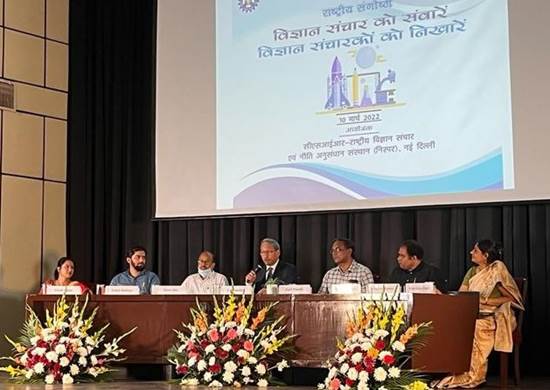
Speakers of Session-2 (From L-R): Ms Sonali Nagar, Shri Zubair Siddiqui, Shri tarun Kumar Jain, Dr C.M. Nautiyal, Shri kapil Tripathi, Dr Arvind C. Ranade and Dr Rashmi Sharma
The Valedictory Session was chaired by Dr Nakul Parashar, Director, Vigyan Prasar. Shri Hasan Jawaid Khan, Chief Scientist, CSIR-NIScPR presented the summary of the Seminar. Guest of Honour, Dr Geetha Vani Rayasam, Head, CSIR-HRDG said that pandemic has shown that science communication is essential, be it the hesitancy, vaccination, covid tests and all. Guest of Honour, Dr Rashmi Sharma, Scientist of DST said that science communication plays very vital role in the society and during the pandemic time, we saw that how science communicators tackled to provide the authentic scientific information. Vote of thanks was proposed by Dr Manish Mohan Gore, Scientist, CSIR-NIScPR.
Women Leaders in CSIR discussed their Experiences on work-life balance
On 10 March 2022, CSIR-NIScPR organized the CSIR Women Scientists Meet at CSIR-NPL, New Delhi. During this event, a report titled “Women in STEM: A CSIR Survey towards Gender Parity” by Prof Ranjana Aggarwal, Dr Sandhya Wakdikar and Dr Praveen Sharma from CSIR-NIScPR was released by Dr Sharmila Mande, Distinguished Chief Scientist, TCS Research.
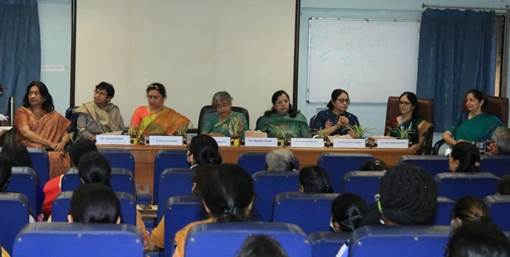
After the release, a half day workshop on “Women leaders in CSIR: Experiences on work-life balance” was held where women holding headships in various CSIR Scientific divisions shared their experiences on balancing work with life. In the workshop, around 50 women staff and students of NIScPR and NPL assembled.
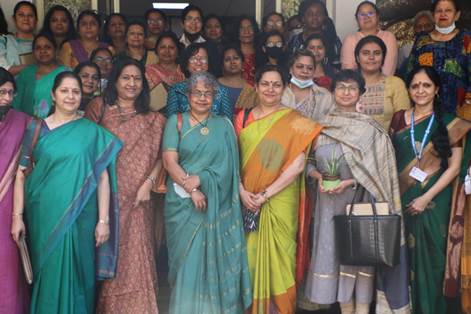
The Program began with the welcome of delegates by Dr Sandhya Wakdikar, Senior Principal Scientist at CSIR-NIScPR. Prof Ranjana Aggarwal, Director CSIR-NIScPR gave introductory remarks to the report and the program.
Dr Sharmila Mande was the Chief Guest of the program who shared her experiences on balancing work with life.
The Women leaders of CSIR who shared their experiences with the audience were Dr Suman Kumari Mishra Director CSIR-CGCRI; Dr Geeta Vani Rayasam Head, CSIR-HRDG; Dr Vibha Malhotra, Head, IPU & TMD; Dr Purnima Rupal, Head DGED & SCDD, CSIR; Dr V.J. Sattigeri, Head, TKDL; Dr Rama Swami Bansal, Head, ISTAD. This was followed by an interactive discussion on the topic.
<><><><><>
SNC/RR
(रिलीज़ आईडी: 1805115)
आगंतुक पटल : 1151